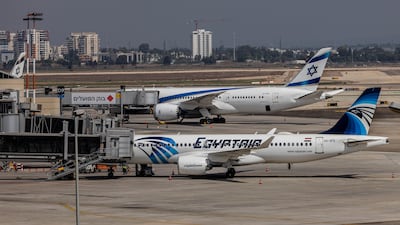Egypt is seeking to boost co-operation between national flag carrier EgyptAir and the private sector, Civil Aviation Minister Mohamed Abbas said.
Mr Abbas met the heads of some of the country’s biggest private sector aviation companies on Sunday to discuss future projects with EgyptAir in a bid to boost the country’s tourism sector and ailing economy.
The ministry promised to do all it could to help private aviation companies compete with international and regional airlines.
“Private aviation companies are an integral part of Egypt’s civil aviation sector,” said a ministry statement on Sunday. “There are discussions and exchanges of ideas and viewpoints taking place with the private sector that will develop the local aviation sector and the national economy.”
EgyptAir has been operating at a loss since Covid-19 halted all commercial flights for several months. So, a partnership with the private sector could be a lifeline for the airline at a time when the country is facing high inflation and a drop in the value of the local currency.
The company has had to borrow from the government to stay afloat.
In 2021, a group of MPs publicly criticised EgyptAir for being a burden on the national budget. The company received a 5 billion Egyptian pound ($164.8 million) loan later that year.
The chairman of the airline’s holding company Mohamed Zakaria said at the time that EgyptAir was losing 500 million pounds a month after the Covid-induced slump and that the company would be streamlined to increase profit.
In October, billionaire Naguib Sawiris said EgyptAir could pull itself out of financial trouble by selling 30 per cent of its shares to private companies on the stock market.
In January, Mr Abbas said a new plan had been devised to cut the company’s losses but did not reveal any details.
The announcement was followed by a number of unconfirmed reports that the government had reached an agreement to privatise the airline.
However, suggestions that a national symbol such as EgyptAir might be privatised were met with outrage on social media.
The backlash led Mr Abbas to issue a statement on January 25 denying the reports.
He said the airline was returning to being profitable and reports of its sale were nothing more than rumours meant “to attack the company during a trying time”.
In June, the government announced its State Ownership Policy Document, a large-scale plan to sell national assets to private companies in a bid to withdraw from various industries and attract about $40 billion in private sector investment over four years.
The document, which was ratified on January 1 by President Abdel Fattah El Sisi, included specific guidelines for foreign companies.
After a report last month by the International Monetary Fund said Egypt would most likely have to sell $8.6 billion in state assets to bridge some of its financing gap, the government came under fire from Egyptians opposed to such a sale.


